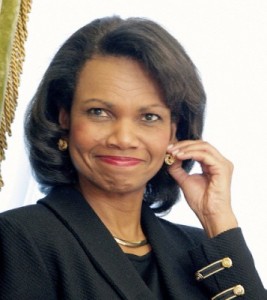 Says we can’t afford to be war weary.
Says we can’t afford to be war weary.
by Stephen F. Hayes
Former Secretary of State Condoleezza Rice accused Barack Obama of dramatically weakening the United States’ position in the world, drawing a straight line between Obama’s ever-yielding foreign policy and the increasing troubles around the world.
“Right now, there’s a vacuum,” she told a crowd of more than two thousand attending the National Republican Congressional Committee’s annual dinner last night in Washington, D.C. “There’s a vacuum because we’ve decided to lower our voice. We’ve decided to step back. We’ve decided that if we step back and lower our voice, others will lead, other things will fill that vacuum.” Citing Bashar al Assad’s slaughter in Syria, Vladimir Putin’s aggression in Ukraine, al Qaeda’s triumphant return to Fallujah, Iraq, and China’s nationalist fervor, she concluded: “When America steps back and there is a vacuum, trouble will fill that vacuum.”
Rice – measured in tone, but very tough on substance – excoriated Obama administration policies without ever mentioning the president by name. She mocked the naïve hope that “international norms” would fill the vacuum left by U.S. retreat and blasted the president for hiding behind the weariness of the public.
“I fully understand the sense of weariness. I fully understand that we must think: ‘Us, again?’ I know that we’ve been through two wars. I know that we’ve been vigilant against terrorism. I know that it’s hard. But leaders can’t afford to get tired. Leaders can’t afford to be weary.”
Rice’s speech was the highlight of an evening that brought in $15.1 million for House Republicans. The former secretary of state has mostly limited her political appearances since leaving office to major events. She delivered a well-received speech at a donor event that Mitt Romney held in Park City, Utah, in 2012 and addressed the Republican National Convention in Tampa that summer. But those familiar with her thinking say she’s determined to help Republicans pick up the Senate and maintain the House heading into the 2016 presidential elections.
House majority whip Kevin McCarthy introduced Rice and raised the prospect that she might become even more involved in politics in two years. After listing various prestigious positions she’s held, he noted, “There’s one thing that’s not on her resume and I want her to put her mind to it to resolve that in 2016.”
Rice has downplayed those suggestions and there’s little reason to believe she’s angling for a run. Still, she has been increasingly active on behalf of her fellow Republicans. Earlier this month, Rice spoke at a Kentucky fundraiser for Senate minority leader Mitch McConnell and the spring convention for the California Republican party. Rice appeared in an ad touting Alaska Senate hopeful and Marine reservist Dan Sullivan, a spot paid for by Karl Rove’s super PAC, American Crossroads. In the coming months, she will make appearances for the National Republican Senatorial Committee.
Rice began her speech Wednesday with something of a civics lesson, praising the wisdom of the framers of the Constitution for the limits they placed on government and noting that Americans, despite being the “most individualistic people on this earth, are also the most philanthropic and communitarian.” Rice trundled through well-worn Republican lines on lower taxes and less regulation before once again touting the American system for its recognition of a “vast private space into which the government should not intrude” and a “personal space, where we respect each others’ choices.”
Before turning to foreign policy, Rice urged the crowd, including many Republican House members, to keep America a “nation of immigrants” and strafed liberals who send their kids to private schools but write New York Times op-eds claiming that school choice will ruin public schools.
But the most powerful part of her speech came when Rice expressed her frustration with Obama on national security. “As Ronald Reagan said: Peace only comes through strength,” she recalled.
“So, what are we doing? What are we doing when our defense budget is so small that our military starts to tell us that we may not be able to carry out all of the requirements put upon it? What are we doing, when a couple of weeks before Russia invades Crimea we announce that we are going to have an Army smaller than at any time since the Revolutionary – I’m sorry, not the Revolutionary War, but World War II. What are we doing? What are we doing? What are we signaling when we say that America is no longer ready to stand in the defense of freedom?”
. . . . . . . . . . . . . . . . . . . .
Stephen F. Hayes is a senior writer at The Weekly Standard.